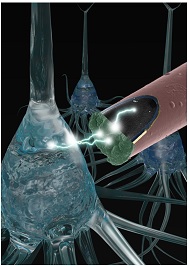
McGowan Institute for Regenerative Medicine affiliated faculty member Takashi Kozai, PhD, assistant professor of bioengineering at the University of Pittsburgh Swanson School of Engineering, will act as co-vice chair at the inaugural Gordon Research Conference on Neuroelectronic Interfaces. The meeting will take place March 25-30, 2018 in Galveston, Texas.
As part of the five-day event, Dr. Kozai will lead a discussion on “Biomechanics of the Device-Tissue Interface.” The program also includes McGowan Institute for Regenerative Medicine faculty member Tracy Cui, PhD, William Kepler Whiteford Professor of Bioengineering at Pitt, who will present a talk titled “Biomimetic Strategy for Seamless Neural Electrode-Tissue Integration.”
Neuroelectronic interfaces—commonly known as brain-machine (or brain-computer) interfaces—create a direct communication line from the central nervous system to the outside world. This connection allows scientists to research ways to rehabilitate those with paralysis, other forms of motor dysfunction, or limb loss.
“One major limitation for practical clinical translation, despite nearly 60 years of chronic neural interface research, is that there remains a poor understanding of the complex biological and material failure modes across all classes of microelectrode arrays,” Dr. Kozai explains. “Among several classes of multi-modal problems encountered, the strong foreign body response, scar tissue formation, and implant material breakdown over time are critical obstacles. These issues ultimately lead to an electrical decoupling of implanted devices from the brain and a loss of signal.”
“Our inaugural Gordon Research Conference (GRC) on Neuroelectronic Interfaces will challenge the international field to turn back to the drawing board of basic materials research armed with emerging basic neurosciences knowledge,” Dr. Kozai says.
The event will bring together a multi-disciplinary team of leading experts in cellular neuroscience, brain pathology, neuro-technology, and materials science to discuss and eventually solve these challenges in order to achieve a chronically useful and reliable neural interface.
Dr. Kozai leads the Bio-Integrating Optoelectric Neural Interface & Cybernetics Lab (B.I.O.N.I.C. Lab) in the Swanson School of Engineering. The lab takes a multidisciplinary approach to better understand interactions at micro-scale neural interfaces and develop next-generation neural technologies that reduce or reverse negative tissue interactions.
“As both scientific knowledge and technological advances progress, we’re finding that many of the assumptions that were made in the field are limited in scope, or incomplete,” Dr. Kozai says. “As a result, we see more and more of these dogmas fall apart as we push the limits of engineering.”
“The Gordon Research Conference is unlike most other conferences in that you get to spend a week sitting shoulder to shoulder with the leaders in the field to discuss new ideas and emerging research and development,” Dr. Kozai says. “We’ve been fortunate enough to bring together an all-star list of the world’s expert scientists and engineers.”
Applications for this meeting must be submitted by February 25, 2018.
See the research being done at Pitt’s Human Neural Prosthetics Program.
Illustration: Electrophysiological signals being detected from neurons (blue) with a sub-cellular sized implantable composite microelectrode designed to stealthily avoid the foreign body response. (Image by TDY Kozai/BionicLab.ORG)
Read more…
University of Pittsburgh Swanson School of Engineering News Release
